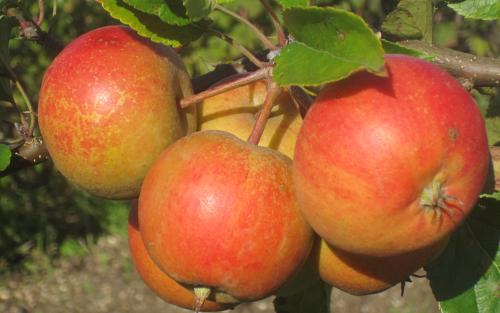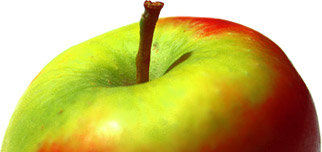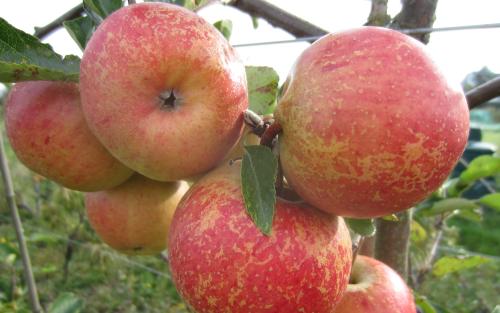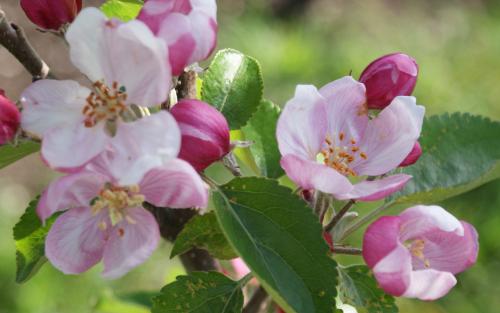
Rubinette is a modern apple variety developed in Switzerland between 1964 and 1982, and also known and trademarked as Rafzubin. It was raised by Walter Hauenstein, a grower from Rafz (hence 'Rafzubin') in the north of Switzerland.
Hauenstein's initial intention was to produce an improved Golden Delicious, retaining that variety's excellent production and storage characteristics whilst adding more depth of flavour by cross-pollinating it with varieties such as Cox's Orange Pippin. However things did not go to plan - instead of an improved Golden Delicious, Hauenstein's new apple turned out to be something far more remarkable.
Rubinette is moderately good-looking, with characteristic orange and dull red streaks over a light green/yellow background. The apples are generally small to medium-sized. Overall the appearance is attractive but in a rather subdued sort of way.
There is also a natural red sport known as Red Rubinette or Rubinette Rosso which was discovered by Jochen Hubschneider. The red coloration is still quite dull compared to most red apple varieties, even so it is a more pleasing apple than the original.
The parentage is Golden Delicious pollinated by (probably) Cox's Orange Pippin - a very popular combination with other growers over the years.
The obvious comparison is with Freyberg, which has the same parents - Freyberg has a very different flavour and colour though, far closer to Golden Delicious, but the shape is similar to Rubinette.
Rubinette is unfortunately not easy to grow. Like Cox it is prone to the apple disease scab. Mild attacks do not affect the flavour but make the apples rather unsightly and this limits its commercial appeal. The trees are quite weak and slow growing which does not help (vigorous varieties can sometimes throw off disease and pest attacks more readily). One thing we have noticed is that the Rubinette Rosso variant seems less affected by scab, and the apples have a cleaner appearance.
The apples also tend to be very small, although the size can improve as the tree gets older - and as noted below, ruthless thinning in late spring will increase the size of the remaining fruits. These horticultural difficulties mean that Rubinette is not widely grown - it is grown commercially on a small scale in Europe and a few North American growers have also taken it up. As a result, it is difficult (but not impossible) to find Rubinette apples on sale.
Growing your own tree may therefore be the best option, albeit a frustrating experience in some years. Although developed (like most modern varieties) to work with the popular commercial dwarf M9 rootstock, for garden use, we recommend you try the more vigorous MM106 rootstock. This rootstock suits the weak growth habit better, and also gives you more training opportunities - including espalier forms, which can be easier to monitor in a garden environment for the inevitable scab, mildew, and aphid attacks, as well as giving potentially better fruit quality. We have also heard some unsubstantiated reports that fruit size is better on MM106 for this variety (for most varieties M9 gives larger fruit size than MM106). Rubinette really benefits from a spray programme (conventional or organic) and if you go the un-treated route then you are going to have to accept lesser quality - although it is worth persevering (our own Rubinette trees are un-treated).
There is some good news though: whilst it is quite difficult to grow clean examples, we have almost never had a bad Rubinette - so if you can get the tree to actually produce a crop, you can rely on the flavour to be consistent. This is not like Cox, where the flavour can vary considerably from year to year. Another point in its favour is that Rubinette has a wider climate range than Cox's Orange Pippin, and is therefore a better choice for gardeners in much of the USA where summer temperatures are too high for Cox.
We have received some horticultural information from Promo-Fruit, the originators of Rubinette (see www.promo-fruit.ch). They recommend that it is important to ensure that the fruit is heavily thinned. Allow no more than 1 fruit per set of blossoms, and make sure you remove the central fruit in the cluster (which tends to be the biggest, known as the 'king' fruit). From our own experience we think this is good advice - be ruthless with the thinning, and you will be rewarded with at least a few apples of good medium size. If you don't thin, the apples will be too small.
So, a moderately attractive small apple that is not that particularly easy to grow and needs a lot of thinning ... why bother? Well, very simply, this apple has a superb flavour. Regardless of the contribution from Golden Delicious, there is no doubt that Rubinette is a Cox-style apple through and through. It is intense and honeyed, with echoes of pear-drops, simultaneously sweet and sharp. Of all the Cox offspring, Rubinette surely gets closest to having that elusive greatness - and many would argue it is even better than Cox. Interestingly, although the addition of the sweetness of Golden Delicious might be expected to make Rubinette sweeter than Cox, somehow this has not happened, and if anything Rubinette is slightly sharper than Cox - but the sweetness from the Golden Delicious gives a richness to the sharpness. We have speculated that perhaps it is the rich influence of the parent of Golden Delicious - Grimes Golden - that has somehow been carried over into Rubinette. Whatever the cause, the balance of sweet and sharp in Rubinette is probably the best of any apple variety.
Rubinette apple identification images
All images copyright Orange Pippin unless otherwise stated.
USDA identification images for Rubinette
The identification paintings in the USDA Pomological Watercolor Collection span the years 1886 to 1942.
Citation: U.S. Department of Agriculture Pomological Watercolor Collection. Rare and Special Collections, National Agricultural Library, Beltsville, MD 20705.
Parents and other ancestors of this variety
- Cox's Orange Pippin (parent)
- Golden Delicious (parent)
Offspring of this variety
Sports of this variety
Sports are natural genetic mutations of the original variety.
Siblings of this variety (same parentage)
- Freyberg - Freyberg takes after Golden Delicious, whereas Rubinette takes after Cox
Visitor reviews
- 19 Oct 2022A delicious apple. Sold by Breinton Fruit Farm, Hereford if anyone in this area wants to try it before planting. My tree is on M9 rootstock. It produces fine clean fruit in dry-ish years and tends to get scab in wetter years, e.g. 2021. I've never sprayed it. I moved the five year old tree in 2017 to a position where it gets more of a breeze. That possibly reduced scab too. On this soil, most apple trees grow far too large on MM106 rootstock, except possibly a few old varieties which produce tiny trees. Rubinette might do well on the slightly less dwarfing M26. But I've no time to try. The tree on M9 produced 16 kg apples in 2022. That's more than enough, given the number of varieties I have. On M9, if it's thinned well, fruit size is fine. Most apples weigh 120-140 g each. If it's not thinned, they're too small for my liking. In that respect, it's like Sunset. Both varieties tend to overcrop.
- 04 Mar 2018 IA, AustraliaBest tasting apple? Quite possibly. I got a dozen apples off my second leaf tree this past fall and I cannot wait for September to come around again. It is crisp, juicy, intensely sweet/tart/aromatic all at once. Magnificent! Every apple wishes it tasted this good!
- 08 Oct 2015 United StatesJust came back from France (October, 2015) where I tried a Rubinette apple for the first time from the little grocer next to our Paris apartment. Loved it so much, I went back several more times! Best apple I ever had - and hope I can locally source a grower.
- 25 Sep 2015 OHIO, United StatesLove this apple for it's hint of pear taste and it's crispness. For the commenter from Greene OH -- Branstool Orchard in Utica OH grows quite a few of these. They have them available beginning in early Oct and they are worth the trip to get some!
- 04 Apr 2015 WASHINGTON, United StatesWe grow over two hundred varieties of apples in our orchard. Rubenette is the best eating apple we have and sell at our roadside stand. Although the size is nedium small it is not a distraction, however we are testing chemical thinning sprays and have noticed Rubinette on M-9 rootstock produces a half size larger apple than on seedling rootstock. We are testing to grow this apple on the more precocious rootstocks to improve size. As a commercial grower, we have access to sixe improving chemicals that do help, unfortunstely these products are not available tp backyard growers.We have no pest issues specific to this apple.Here at Feul 1908 Famoly Orchard we intent to grow Rubennette on a anall commercial scale.
- 29 Dec 2014 OH, GREENE, United StatesStumbled onto this apple in Paris, FR this Fall (2014) at the produce shop next to Frenchie's Bistro. Impulsively bought a few and back out on the street, bit into one and immediately said to my son, "this is the best apple I've ever tasted", as said on the heading of the "Features" tab! Went back into the shop and bought some more. Then found the in the farmer's market in Truville, Normandy. Only wish it was more easily available here in the States. Can't wait to find them again!!
- 04 Sep 2014 BC, CanadaVery cruncy and tasty apple!! My favorite so far.
- 16 Jun 2014 WA, United StatesBest apple I've ever eaten. I discovered then at the Queener Fruit Farm in Scio, Oregon, and we ended up going back 3x last year to buy more (by the bushel). The flavor and juiciness are amazing. We are going to plant 5 trees of our own this year. I'm sorry to hear that this variety is difficult to grow, but I'll be happy to eat whatever I can get. It will be worth any amount of trouble. I thought the small size was elegant.
- 17 Nov 2013 KENT, United KingdomWhat a disaster. As another said 'But not a good grower, prone to scab, canker, never looks very healthy and mostly small fruit'. Lousy for two years after purchase. All fruit badly affected. Embarrassed for of all the apples I could buy, I buy this one as the marketing says best apple in the world.
- 17 Aug 2013 NORTH CAROLINA/ STOKES, United StatesI have two trees on m27 root stock in fourth year produced about 12 apples last year. I may have picked early but they were very good even after a very hot year .
- 16 Apr 2011 NORTHUMBERLAND, United KingdomYou say that it is surprising that Switzerland should produce a variety of apple, but this country produces more apples the the whole of the UK with only a tiny fraction of the area of fertile land. See: http://en.wikipedia.org/wiki/List_of_countries_by_apple_production
- 08 Oct 2010 WASHINGTON, United StatesI picked a bushel of these at a local orchard the other day (sorry, Charles from Portland, rubinettes are grown in Washington), and I'm in the process of making some of them into applesauce. These are by far the tastiest apple variety I've tried in a long time. I'm already planning on returning to the same orchard next fall to get some more rubinettes, and I'll be looking for them at farmers' markets over the next few weeks.
- 28 Oct 2009 GERMANY, GermanyI really don't care for the Granny Smith. This variety tastes only sour to me. In the US people always seem to swoon about Granny Smiths and how good they are in apple pies. I think Braeburns are much more flavorful both for eating and baking. I really like Pink Ladys also, but Rubinettes are, by far, the tastiest apples I have ever eaten.
- 28 Oct 2009 GERMANY, GermanyTried these for the first time a couple of weeks ago. I can only say this is the most delicious apple I have had in years. Has anyone tried baking them in a pie?
- 17 Oct 2009 SHROPSHIRE UK, United KingdomWe have just returned from an apple festival in Leominster. Amongst the 100's of apples on display was the magnificent rubinette. Crisp-juicy-flavoursome-tart-most tasty apple we have had for years. small but mouthwatering
- 26 Oct 2008 COLOGNE, GermanyTried these for the first time today, in the absence of Honeycrisp, picked up a 5 kg bag of Rubinettes at Krewelshof in Lohmar (near Cologne/Bonn). Delicious!
- 24 Oct 2008 NEW YORK CITY, United StatesFound some of these today at the Union Square Greenmarket. Didn't notice the name of the vendor, but believe me I'm going to look for him again! What a wonderful little apple! Tender-crisp, juicy and sweet, and just enough tartness (without being "sour") to make for a perky mid-day snack. I will be back for more; the vendor said he doesn't have these for long, so I'm going to have to hurry!
- 11 Apr 2008 CALIFORNIA, United StatesRubinette did well in our low-chill, hot inland valley in a warm climate in Southern California. Extreme summer heat did not bother it and the flavor and crunch were outstanding. There is no disease here, so that was not a problem and it bore early and heavily. It may be one of the best Cox crosses for our area, much better than Freyberg.
- 01 Mar 2008 CARMARTHEN, WEST WALES, United KingdomI bought some Rubinette at a local supermarket on the reduced counter, they were the best apples I have eaten, after asking for them again I was told that they dont stock them , just sometimes a box comes in to be sold as secounds. I have been asking for them everywhere i go with no sucsess
- 23 Nov 2007 PREUILLY-SUR-CLAISE, FranceBought some today (23.11.07), grown locally at Coussay les Bois, and thought they might be local French variety, hence went online to check after tasting. Bought because of Cox like appearance, although our specimens are of medium size, larger than what is often available in England under the name of Cox. This apple is a revelation and to eat is superior to all but the very best, appropriately ripened Cox. We think your description of the eating quality - its balance of sweetness and sharpness - is spot on for the specimens we bought. We would add that the texture though crisp is less firm. We think that as a result it would very much appeal to childrenl. We'll be buying again and certainly more to take home to UK.
- 09 Nov 2007 SURREY, United KingdomWe bought some from RHS Wisley today, and I thought they could have been mislabled Cox's until I read your piece. They were not small though - getting on for medium sized. They were as you describe to eat, and even better cooked. The flavour improved and they kept their shape well with a lovely yellow-green colour.
- 21 Oct 2007 PORTLAND, OREGON, United StatesWe just discovered this variety through a local market, and apparently they are one of the few varieties being grown exclusively in Oregon (as opposed to the many grown to the north in Washington State). Very tasty and a good eating apple.
- 18 Oct 2007 NORFOLK, United KingdomWe have 15 of these trees on our orchard. Undoubtably the best tasting variety we grow - cox like with greater acidity. At its best in November. But not a good grower, prone to scab, canker, never looks very healthy and mostly small fruit.
- 08 Oct 2007 EAST SUSSEX, United KingdomFour of us went to the Open Day at Keepers Nursery in Kent yesterday, and spent a couple of hours tasting a huge variety of apples, and we all kept coming back to Rubinette. The blend of sharpness and sweetness, the crispness and juiciness, and the thin skin all contributed to to our choice. The smallish size and Cox-like appearance are advantages as well.
- 03 Aug 2007 United KingdomYou don't mention the marvelously crisp texture of this variety. I served these whole, for dessert after quite a formal dinner last night, and people raved about them. In this context, the small size is a positive attribute.
Tree register
United States
- Alfredo Espino in Stockton, CALIFORNIA
- Axel Kratel in Santa Cruz, CALIFORNIA
- Beth Matney in Bauxite, ARKANSAS
- Carol Lawrence in Mattapoisett, MA
- Cynthe in ARIZONA / YAVAPAI COUNTY
- Dan Spratlen in Camano Island, WASHINGTON
- Dan Vorhis in FREELAND, WA
- Daryl King in Denver, CO
- Dennis in Bradford, DARKE, OH
- Florian Deisenhofer in Brush Prairie, WA
- Garth Wermter in Gordonsville, VIRGINIA
- Helen Graben in Greenville, SC
- Jerry Hudgins in Point Reyes Station, CALIFORNIA
- Jessica Klein in Maple Valley, WASHINGTON
- Jim Gana in Hallstead, PA
- Jo Elsmore in BLOORS,
- Jon Shannon in Shaw Island, WA
- Joseph Sferrazza in Commack, NEW YORK
- Joshua in Port Deposit, MD
- Judd Curran in MISSOULA, MONTANA
- Kati in Milwaukee, WI
- Magda Jackson in LAFAYETTE, INDIANA
- Mark A. Rock in Columbia Station, OHIO
- Mike Haller in SIOUX CITY, IOWA
- OrangePippin-Scott in Traverse City, MI
- Paul Gerrish in Newbury, MA
- Paul Gerrish in Newbury, MA
- Randy Anderson in MONTICELLO, KY
- Ray Wickline in Middletown, MARYLAND (MD)
- Red in Arcata, CA
- Rex Callis in Pittsboro, IN
- Rex Callis in Pittsboro, IN
- Rick Simoniello in Storrs / Mansfield, CT
- Ricky Bruckner in RAVENNA, OHIO (OH)
- Robert Smith in Boulder, CO
- Ryan Grover in Vineyard, UTAH
- Shawn in BREVARD, NORTH CAROLINA
- Stephan Orchard in Westfield, INDIANA
- Surik Mehrabyan in Ithaca, NY
- Susanne in Tacoma, WASHINGTON
- Sylvia Allen in Portland, MULTNOMAH/OREGON
- Ted S. in Reading, PA
- Thomas Griffith in COTTAGE GROVE, WI
- Tom Herlache in GRAND LEDGE, MICHIGAN
- William Sommerville in South Dartmouth, MA
United Kingdom
- Andrew C Ross in Eastleigh, HAMPSHIRE
- Clifford Cain in Doncaster, SOUTH YORKSHIRE
- David in Hereford,
- Graham Cox in Hothfield, UK
- Graham Hinchliffe in Eastbourne, EAST SUSSEX
- Hans Butler in Loughborough, LEIESTERSHIRE
- Kevin Armstrong in Ipswich, UK
- Nick Miller in London,
- Peter Barnard in Doncaster, LINCOLNSHIRE
- Rb in WIMBORNE, DORSET
- Richard Borrie in York, YORKSHIRE
- Ron Stern in Oxford, OXFORDSHIRE
- Tammy Jackson in Lavenham, Sudbury, SUFFOLK
- Tim Hughes in Wisley, SURREY
France
- Richard Borrie in Objat,
Portugal
- Luis Godinho in Sao Mamede, BATALHA
Spain
- Jorge Ramirez in VALENCIA, VALENCIA
Canada
- Roger Macpherson in Delta, B.C.
Spring blossom records for this variety
2022 season
- 13th May 2022 - tree owned by Jim in Hallstead, United States
2021 season
- 4th May 2021 - tree owned by Jim in Hallstead, United States
- 4th May 2021 - tree owned by Jim in Hallstead, United States
- 4th May 2021 - tree owned by Jim in Hallstead, United States
- 4th May 2021 - tree owned by Jim in Hallstead, United States
2020 season
- 21st May 2020 - tree owned by Jim in Hallstead, United States
- 22nd April 2020 - tree owned by Jerry in Point Reyes Station, United States
2019 season
- 10th May 2019 - tree owned by Jim in Hallstead, United States
- 24th April 2019 - tree owned by Jerry in Point Reyes Station, United States
- 20th April 2019 - tree owned by Ryan in Vineyard, United States
2018 season
- 15th May 2018 - tree owned by Jim in Hallstead, United States
- 27th April 2018 - tree owned by Jerry in Point Reyes Station, United States
2017 season
- 12th April 2017 - tree owned by Jerry in Point Reyes Station, United States
2016 season
- 13th May 2016 - tree owned by Jim in Hallstead, United States
2015 season
- 13th May 2015 - tree owned by Jim in Hallstead, United States
2014 season
- 17th May 2014 - tree owned by Jim in Hallstead, United States
2013 season
- 11th May 2013 - tree owned by Jim in Hallstead, United States
- 9th May 2013 - tree owned by Alfredo in Stockton, United States
2012 season
- 11th May 2012 - tree owned by Florian in Brush Prairie, United States
- April 2012 - tree owned by Ray in Middletown, United States
2011 season
- 13th April 2011 - tree owned by Graham in Hothfield, United Kingdom
Record your blossom dates in our Fruit Tree Register - more >>.
Harvest records for this variety
2021 season
- 4th week September 2021 - tree owned by Susanne in Tacoma, United States
2020 season
- 4th week September 2020 - tree owned by Susanne in Tacoma, United States
2019 season
- 3rd week October 2019 - tree owned by Jerry in Point Reyes Station, United States
- 3rd week October 2019 - tree owned by Jon in Shaw Island, United States
2018 season
- 3rd week October 2018 - tree owned by Jon in Shaw Island, United States
- 1st week October 2018 - tree owned by Jerry in Point Reyes Station, United States
2017 season
- 4th week September 2017 - tree owned by Jerry in Point Reyes Station, United States
2012 season
- 3rd week September 2012 - tree owned by Dan in Camano Island, United States
- September 2012 - tree owned by Andrew in Eastleigh, United Kingdom
2009 season
- 3rd week September 2009 - tree owned by Richard in York, United Kingdom
Origins
- Species: Malus domestica - Apple
- Parentage: Golden Delicious x Cox's Orange Pippin
- Originates from: Rafz (north of Zurich), Switzerland
- Introduced: 1964
- Developed by: Walter Hauenstein
Identification
- Country of origin: Switzerland
- Period of origin: 1950 - 1999
- Fruit colour: Orange flush
- Flower colour: Pink - light
- Leaf colour: Green
- Popularity: Best sellers
- Annual cycle: Deciduous
Using
- Picking season: Late
- Keeping (of fruit): 1-2 months
- Flavour quality: Exceptional
- Flavour style (apples): Sweet/Sharp
- Discoloration of fruit: Oxidising
- Vitamin C content: Low
- Cropping: Light
- Fruit persistence: Normal ripening
- Food uses: Eating fresh
- Picking period: early October
- Wildlife: RHS Plants for Pollinators
Growing
- Gardening skill: Average
- Flowering group: 3
- Pollinating others: Average
- Ploidy: Diploid
- Vigour: Weak growing
- Bearing regularity: Regular
- Fruit bearing: Spur-bearer
- Self-fertility: Not self-fertile
Climate
- Frost resistance of blossom: Some resistance
- Cold hardiness (USDA): Zone 4 (-34C)
- Climate suitability: Temperate climates
- Climate suitability: Warm climates
- Summer average maximum temperatures: Cool ( 20-24C / 68-75F)
- Summer average maximum temperatures: Warm (25-30C / 76-85F)
Other qualities
- Disease resistance: Poor
- Scab (Apple and Pear): Some susceptibility
- Powdery mildew: Some susceptibility
- Fire blight: Some susceptibility
Where to buy trees
The following tree nurseries offer Rubinette apple trees for sale:
- Orange Pippin Fruit Trees (USA) United States
Rubinette apple trees - Orange Pippin Fruit Trees (UK) United Kingdom
Rubinette apple trees - Cummins Nursery
United States More >>
Where to buy fresh fruit
The following orchards grow Rubinette:
United States
Maine
- Tiny Orchards, Saco
New Hampshire
- Lull Farm, Hollis
New York
- Bellinger's Apple Orchard, Fultonville
Pennsylvania
- Hollabaugh Brothers, Biglerville
Washington
- Skipley Farm, Snohomish *** Feature Orchard ***
United Kingdom
England - midlands
- Walsgrove Farm, Worcester
France
Poitou-Charente
- Les Vergers de Vendée, Maureuil sur Lay
Canada
British Columbia
- Apple Luscious Organic Orchards, Salt Spring Island
- Salt Spring Apple Company, Salt Spring Island
References
- Apples for the 21st Century
Author: Manhart



